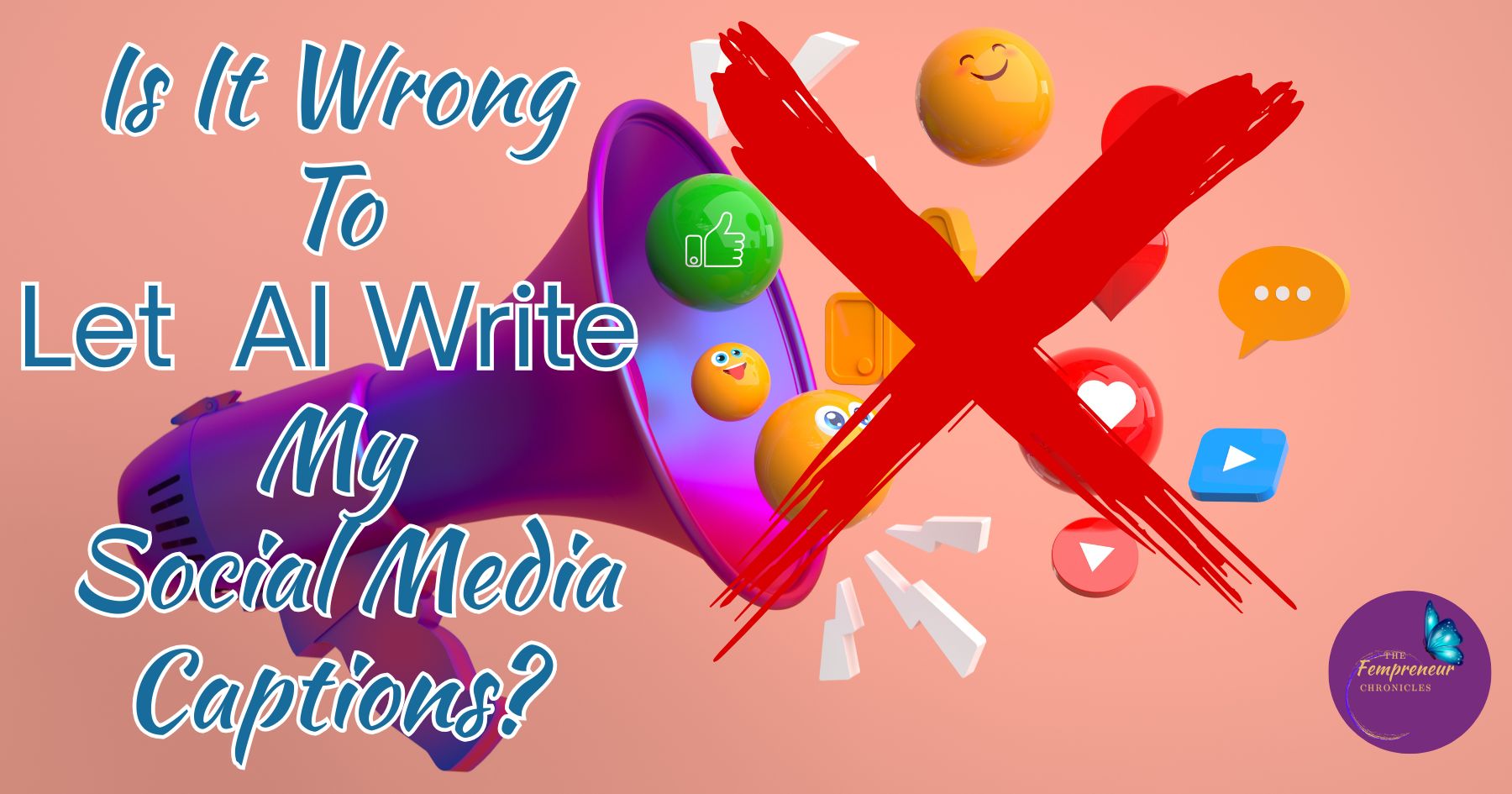- The Fempreneur Chronicles
- Posts
- Is It Wrong to Let AI Write My Social Media Captions?
Is It Wrong to Let AI Write My Social Media Captions?
A Christian Woman Entrepreneur's Guide to Authenticity in the Age of AI

This is for the Christian woman entrepreneur who's wrestling with whether using AI for social media captions is authentic or deceptive. If that's not your current challenge, that's completely okay. Share this with someoneelse.
"Every time a woman comments, 'I needed this today!' I feel like I'm lying to her," she wrote. "She thinks those are MY words, but AI helped me write them. Should I delete my account?"
Note: If you've been carrying this same guilt, what I'm about to share might surprise you—but it's rooted in biblical principles.
Introduction: The Crisis of an AI-Assisted Conscience
Last month feedback from a fellow Christian woman entrepreneur made me pause. She runs a successful business and, for the past several months, has been using ChatGPT, like everyone else to help write her social media captions. The results were awesome—great engagement, a growing audience, and women being genuinely helped. But after a Sunday sermon on authenticity, she was spiraling. (It’s always that Sunday sermon).
"Every time a woman comments, 'I needed this today!' I feel like I'm lying to her," she wrote. "She thinks those are MY words, but AI helped me write them. It feels deceptive. Should I just delete my account?"
Her question resonated so deeply because it’s a conversation I’ve had with lots of faith-driven women in business. We’re all wrestling with the same tension: in a world that demands authenticity, does using artificial intelligence (AI) to craft our message make us frauds? This isn't just a theoretical debate; it's a crisis of conscience for women who are building their businesses on the bedrock of trust and vulnerability.
This guilt hits women entrepreneurs particularly hard. We already juggle the immense pressure to be present for all the people in our family, successful business owners, and devout Christians. We're told to "show up authentically" but also to be perfectly put-together. AI, which promises efficiency, often feels like another area where we're failing—caught between the fear of being inauthentic if we use it, and inefficient if we don’t.
But what if we’ve been asking the wrong question? What if the issue isn’t whether we use AI, but how and why we use it? The Bible, surprisingly, offers a powerful framework for this modern dilemma, not through direct commands about technology, but through the timeless stories of women who masterfully stewarded their resources.
The Biblical Precedent: Why Assisted Work is Not Inauthentic
Authenticity isn’t about doing everything yourself; it’s about the truthfulness of your heart and your message. The most influential women in the Bible understood this. They didn’t work in isolation; they leveraged partnership, delegation, and existing resources to fulfill their God-given callings.
Priscilla: The Power of Partnership
In Acts 18, we meet Priscilla, a tentmaker and church leader who taught alongside her husband, Aquila. Scripture often lists her name first ("Priscilla and Aquila"), a subtle but powerful indicator of her prominence in a patriarchal culture. Priscilla’s voice wasn’t diminished by her partnership; it was amplified. She was one of Paul's esteemed "co-workers in Christ," and her impact was greater because she didn’t work alone.
The Proverbs 31 Woman: The Wisdom of Delegation
We celebrate the Proverbs 31 woman as the ultimate entrepreneur, but we often miss a key detail: she had servants (Proverbs 31:15). She delegated tasks, managed her household and businesses with help, and stewarded her resources wisely. Her strength wasn’t in doing everything herself, but in her ability to lead and manage others effectively. She considered a field and bought it, her trade was profitable, and she provided for her entire household—all through the power of delegation.
Deborah: The Strength of Collaboration
As a prophetess, judge, and military strategist, Deborah was one of Israel’s most powerful leaders. I really like Deborah. Yet, when God called her to lead Israel into battle, she collaborated with Barak. They led together, they fought together, and they celebrated victory together. The Song of Deborah (Judges 5) is a testament to their partnership. Her leadership was her own, but her success was shared, and her authority was never questioned.
Mary, Mother of Jesus: The Beauty of Inspired Words
When Mary sang the Magnificat (Luke 1:46-55), her beautiful song of praise, she drew upon the words of Hannah’s prayer from 1 Samuel 2. She wasn’t plagiarizing; she was weaving the threads of Scripture she knew intimately into the fabric of her own unique story. She used existing, inspired words to give voice to her own miraculous experience, creating something new and beautiful.
These women, and men like the Apostle Paul who used a scribe named Tertius to pen the letter to the Romans, teach us that using assistance doesn’t make us inauthentic. It makes us wise. The question isn’t, “Did I get help?” but “Is my message true?”
Biblical Figure | Form of Assistance | Principle for Today's Entrepreneur |
Priscilla | Partnership with her husband, Aquila | Collaboration amplifies your voice; it doesn't diminish it. |
The Proverbs 31 Woman | Delegation to servants and staff | Wise stewardship involves leveraging help to manage all your responsibilities. |
Deborah | Collaboration with her general, Barak | True leadership knows how to build alliances to achieve a greater goal. |
Mary | Drawing on existing scripture (Hannah's prayer) | Using existing resources and inspiration isn't cheating; it's how creativity works. |
A Practical Framework: The 3 Tiers of AI Usage
Not all AI use is created equal as a lot of folks think. To apply this biblical wisdom, we need to differentiate how we are using AI. I’ve broken it down into three tiers, moving from ethical tool to deceptive ghostwriter. Hopefully it will resonate with you.
Tier 1: AI as a Tool (The Virtual Proofreader)
This is the most basic and ethically sound way to use AI. Think of it as a virtual assistant that helps you polish a message that is already yours.
What it looks like: Using AI to check grammar and spelling, fix typos, rephrase a clunky sentence, or check your tone. You write the core message; AI just cleans it up.
Biblical Parallel: This is like Paul using Tertius to neatly write down the words he was dictating. The message is 100% the author's.
Authenticity Check: Your message, your voice. There are no ethical red flags here. It's simply good stewardship to present your message clearly.
Tier 2: AI as an Assistant (The Brainstorming Partner)
Here, you’re using AI as a creative partner to help you generate ideas and structure your thoughts. You are still the author, but AI helps you overcome writer's block and get started. And sometimes you will get an output of ideas you haven’t thought of. So that can be very helpful.
What it looks like: Asking AI for caption ideas on a specific topic ("Give me 5 hooks about overcoming fear"), suggesting different angles for a devotional, or finding relevant scripture passages. You provide the core concept, and AI offers a starting point.
Authenticity Check: This is where nuance is key. If you take an AI-generated idea and make it your own—infusing it with your personal stories, your unique voice, and your heartfelt conviction—you are still the author. The danger lies in mindlessly copying and pasting.
This is where using AI crosses a clear ethical line for Christian entrepreneurs. In this scenario, you are outsourcing your voice and your message entirely, presenting the work of a machine as your own. You are giving away your authority. You might call this being lazy.
What it looks like: Giving AI a vague prompt like, "Write an inspiring Instagram caption for Christian women entrepreneurs about trusting God," and posting the result without any personal input, story, or theological oversight.
Why it’s a problem: This is deceptive. Your audience believes they are connecting with you—your wisdom, your experience, your walk with God. Instead, they are connecting with a machine. It erodes trust and undermines the very foundation of your ministry and business.
Biblical Principle: This violates the core principle of being truthful in all your dealings (Proverbs 12:22). It is, in essence, bearing a false witness.
The “Before You Post” Authenticity Checklist
To help you better see these distinctions, here are four questions to ask yourself every time you use AI to help with a social media post.:
Is this my message? Does the core idea, the conviction, and the heart behind this post originate from my own walk with God and my unique perspective?
Have I made it my own? Have I infused this message with my personal stories, my specific insights, and my authentic voice? Does it sound like me?
Am being truthful? Am I representing myself and my beliefs honestly? Is there any part of this post that would make my audience feel misled if they knew the process behind it? Sis are you speaking truth to power?
Does this serve my audience with value? Is this post a genuine act of service, intended to encourage, edify, and support the women who follow me, or is it just content for content's sake?
If you can confidently answer "yes" to these four questions, you can post with integrity, knowing that you are using AI as a good steward, not as a deceptive shortcut.
What About Disclosure? A Simple Guide
Some people have asked whether you need to add #AIwritten to every post? In most cases, no. If you are using AI as a tool or an assistant (Tiers 1 and 2), you are still the author. You don’t disclose that you used a thesaurus, prayed with a friend for inspiration, or had your sister proofread your work. However, transparency is very important. If you ever feel that not disclosing your AI use would be misleading or break trust, then disclose it. It’s about you and what you are feeling. Your integrity is worth more than your engagement metrics.
The Real Danger: AI Dependence and Losing Your Voice
The true risk of AI isn’t that it will make you inauthentic, but that it will make you dependent. If you find that you can no longer write without AI, that you’re losing your own unique voice. If you’re spending more time prompting AI than you are praying and listening to the Holy Spirit for a word for your people, then it’s time to take a step back.
AI should be a tool that serves you, not a crutch that you can’t function without. I’m concerned for folks who now only want to view AI as their source. Your unique, God-given voice is your most valuable asset. Don’t let any tool, no matter how powerful, diminish it. Then it becomes a trick of the enemy to use against you.
Frequently Asked Questions (FAQ)
Q: Is it a sin for a Christian to use AI for social media?
A: No, using AI is not inherently sinful. Like any tool, its morality depends on how it is used. If used to deceive or misrepresent yourself, it crosses an ethical line. However, if used as a tool to help you work more efficiently and serve your audience better, it can be an act of wise stewardship, similar to how biblical figures used scribes and assistants.
Q: How can I use AI for captions without being inauthentic?
A: The key is to ensure the core message, story, and conviction are yours. Use AI as a brainstorming partner or a proofreader (Tiers 1 and 2), but always infuse the final content with your unique voice and personal insights. Never simply copy and paste from an AI without making it your own.
Q: Do I need to disclose that I used AI?
A: If you are the author of the core message and have made it your own, you typically do not need to disclose AI assistance, just as you wouldn't disclose using a grammar checker. However, if you feel that not disclosing would be misleading, transparency is the best policy.
Remember, this explores the ethics of Christian women entrepreneurs using AI for social media. It argues that using AI is not inherently sinful but a matter of stewardship. Drawing on biblical examples like Priscilla, Deborah, and the Proverbs 31 woman, it presents a 3-tier framework for ethical AI use, distinguishing between AI as a tool, an assistant, and a deceptive author. It concludes with a practical checklist to ensure authenticity and warns against the danger of AI dependence.
A Final Word of Encouragement
Sister, the fact that you are even wrestling with this question shows that your heart is in the right place. You are not trying to deceive anyone. You are trying to be a good steward of the incredible calling God has placed on your life, balancing the demands of business and family with a desire for integrity.
So, release the guilt. Embrace the wisdom of the women who have gone before us. And use the tools God has given you with discernment, integrity, and a whole lot of grace.
Your voice is needed. Don’t let the fear of imperfection silence it.


Reply